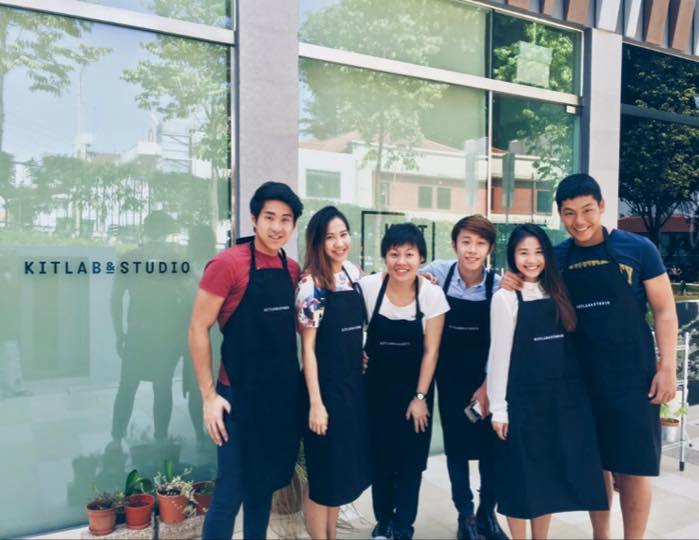
Student-preneur Tiziana Tan wears many hats—from being a co-founder of Air Amber (read more about the Air Amber story here), an organisation that provides support to less fortunate communities across the globe, to running and managing her very own business services and creative agency, Brain Juice Collective (BJC), and juggling her studies as a final year, double major (marketing and corporate communications) student in the SMULee Kong Chian School of Business. Yet, she has no complaints about her busy schedule.

Team BJC at SMU IIE’s Entrepreneur Corner event
“I see them as an integrated whole,” she explains when asked how she balances work and study. “It is not so much of a balance as opposed to constantly finding points of integration and synergy.”
And it is with this ingenuity that she integrates students into the workforce, way before graduation is even in sight. Curating, training and connecting young talented individuals to corporate clients on a project basis, her brainchild, BJC, offers creative and more affordable solutions for the corporate world. Where her corporate clients get quality creative solutions at a price that meets their budget, students get to develop their portfolios and conceptualise real world solutions by being thrust into these highly demanding environments.
“The final topping of joy is then being able to co-create high quality and yet affordable solutions with our clients,” she explains.
We second that. In the midst of current global and economic volatility (think: Brexit), companies are constantly on the lookout for fresh ideas while maintaining a tight budget.
While the initiative already counts projects with companies such as Bottlefly, an app that helps you pick the right bottle of wine for the right occasion, and many other small and medium enterprises (SMEs), last year was particularly exciting for Tiziana and her team of eight, as they embarked on their first national project with the National Youth Convention. Held last October, the event focused on the themes of national identity, terrorism, racism and socio-economic divides. We chat with Tiziana on how BJC is steering the future of our workforce.
1. How does BJC train students looking for potential project matches?
Students working with us fulfil two kinds of roles—freelancers and project managers, to handle projects proposed by the clients of BJC. Training is provided in terms of being attached to a project manager (if you’re a freelancer) or to me if you’re a project manager. Both skill-based and relationship-based training is given. BJC is always pushing our team. Students are often given tasks they’ve never done before or have very little experience with. This forces them out of their comfort zone to find more information offline or online to help them in their various projects.

An exciting 3-month project with Kit Lab & Studio
2. Take us through the journey of BJC, what led you to start it, and how has it grown so far?
The birth of BJC began with a reflection on a personal experience that revealed a gap of blatant inefficiency in delivering fundamental corporate services.
This was an attempt at an innovative solution by meeting assets—the drive, proactive attitude, creativity, and adaptability of youths—to the needs of our corporate clients. Quality is maintained by a system of selection, where project managers are specially selected based not just on their CVs and recommendations, but also their passion and drive. Many of the project managers are people who will step up to leadership roles in their communities in an instant, and in fact do amazing in difficult situations, such as those with high pressure, scarcity of resources, and so on. Ultimately, it was a conviction that students in university possess passion, talent and skills to meet the unending demands from the corporate world for cheaper, better and more creative options.
One example would be our work with the National Youth Convention, which happened late last year, managed by the Association of Muslim Professionals (AMP), BJC, Air Amber in collaboration with the National Youth Council. My project managers are youths themselves and came up with creative yet practical ways to engage the potential audience by utilising their skills and experience from managing other conferences such as the Model United Nations and other school-based activities.
3. What are some stigmas attached to being an intern, and how does BJC help to debunk these prejudices?
Interns are not just there to learn by observation and/or administration. They can play a key role in the process of creation. Peer coaching is a big thing in our organisation. Team members learn from one another and grow as individuals, team players and leaders. The point is that we’ve created a very open and stimulating environment that encourages members and leaders to always push the envelope.

4. What are some challenges that you’ve faced setting up and running BJC and how have you overcome them?
Managing the expectations of both students and clients was and is a big challenge. Clarity is a key in managing this. Constant checking and re-checking with stakeholders of every project ensures for a high level of professionalism and a smoother delivery.
5. How has your education with SMU contributed to the managing of BJC?
SMU has provided me a space where learning can move beyond cognition to practical application. This constant flow from experiences at BJC to the lecture room has made my experience one in which I have gained much value from.
6. Do you think the attitudes toward entrepreneurs and especially student entrepreneurs are changing?
Yes. However, I am not certain if it is for the better. Resilience is a key character trait of any entrepreneur. The lack of this unavoidable trait has led to a high number of individuals taking a shot and not being able to handle the backfire.
7. Who are some of your greatest inspirations when it comes to business and entrepreneurship?
Aung San Suu Kyi. Her story is one grounded in reality but driven by the belief in a dream for tomorrow. This dynamic is something I apply to my business and life.

8. What are some tips/advice you would give young student entrepreneurs?
Find your conviction, feel for your passion then just keep swimming, just keep swimming, just keep swimming, just like Dory in the cartoon Finding Nemo. This simple yet profound statement teaches that in pushing forward, much will be learnt and much will be celebrated. This value must permeate through every aspect of your life, not just in your work.
9. What are some of your future plans for BJC? How would you define success in terms of BJC and in terms of life?
We are spreading our enterprise wings and taking on projects across the globe. My future plan, which is already set in motion, would be going global with BJC, and to engage with many more start-ups, SMEs and social enterprises that can best leverage on our talent pool and service offerings. Success in terms of BJC would be to groom the best people who will become major contributors in whatever organisations and communities they are in, and to become a truly global organisation that is not limited by geographical boundaries. I would also view success as being able to navigate the corporate world without losing our passion and organisational mission. In life, success means waking up with a passion and drive for everything that I do, and the people I engage with.


